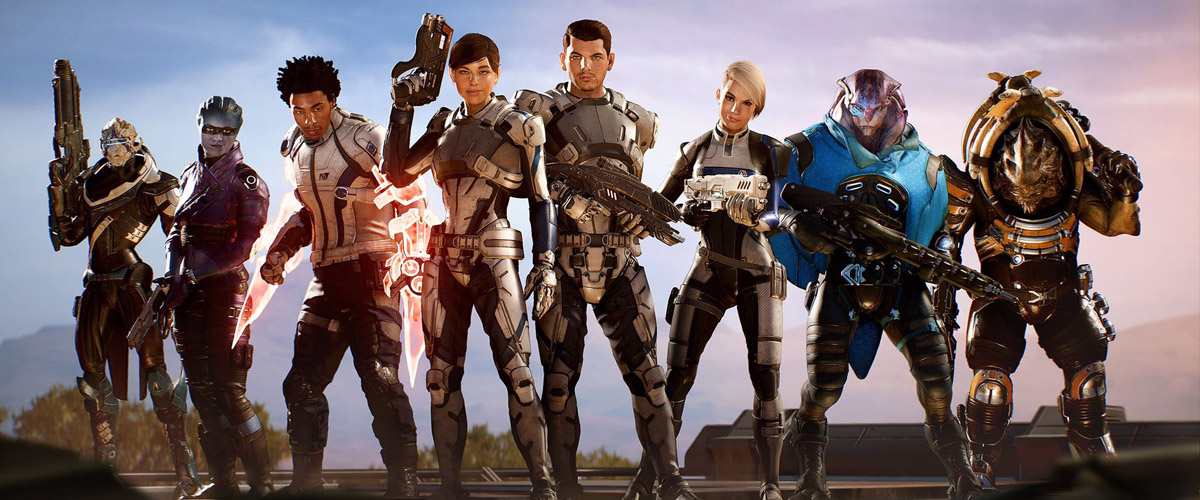Part Five: The Upshot
Here’s one final example that sums everything up: the failure to commit to a story, the unwillingness to challenge the player, the avoidance of meaningful consequence.
Somewhere past the halfway point of the game, your team doctor notices something strange about the outcasts and criminals you’ve been dealing with. The colony project had screened its participants carefully, so it’s strange that so many of them have now turned out to be dangerous and rebellious and violent. At the doctor’s request, you scan several of these people, and after she analyzes the results, she reports that they have some sort of stasis sickness, that being asleep for the six-hundred-year journey has broken their brains somehow. You have the queasy realization that all of these people are not bad guys, not really; they’re instead experiencing something like a psychotic break, and that rather than running around shooting them, you may be able to cure them. And then the doctor cheerfully tells you she’s transmitting her results to leadership, and the game never mentions any of this again, and it’s back to freely gunning down all these sad, sick people like the disposable mooks you originally thought they were.
Sigh.
It’s impossible to know for certain why the game was designed like this, though it seems likely that the resource-and-budget problem was a contributing factor. As noted, you don’t want to spend a significant fraction of your development dollars making stuff most of the userbase won’t see; you want to justify your investment by showing everything to everyone, or at least as much as possible.
But it also must be true that you can’t make decisions about your story outcomes if you don’t have a clear sense of your story to begin with. And as we’ve seen, Andromeda might be bursting at the seams with multiple plots of various sizes, but it has no real story, no central narrative spine to focus the action and provide a basis for an underlying unified objective. So, as a consequence, there was never going to be a clear strategy for keeping all the story moments consistent with each other, or for paying off player choice with story effects.

BioWare’s designers knew they had a rich and interesting world in their Mass Effect universe, and they knew they wanted to continue exploring it, but they never stopped to answer the basic, fundamental question of what the player would be expected to accomplish in a potential new series, or to recognize the need for one overarching dramatic conflict. Instead, they came up with a clever idea for their setting, and then they busied themselves making piles and piles of stuff, characters and locations and events all more or less connected to that setting (including, bizarrely, eight to ten hours of full-fledged epilogue content that you can play through after the credits that follow the climax where you defeat the kett, which is yet another demonstration of the designers’ inability to simply hone in on an actual story). Some of that stuff is, indeed, pretty neat, but it’s all still just a big pile of stuff. Then they organized all that stuff into a framework that would allow it to be sequentially revealed through gameplay; and they stepped back, satisfied, failing to understand that “sequential reveal” is not synonymous with “story.”
Look. I’m a huge fan of Mass Effect. I’ve spent hundreds of hours replaying the original trilogy, exploring all the possible permutations of the branching story, and many more hours reading the tie-in comics and other ancillary material. I was one of the ferocious followers of pre-release Andromeda buzz, and I was a day-one purchaser. I played through the Andromeda story three times, beginning to end, including almost all of the side quests, over dozens and dozens of hours, in an attempt to understand the game, find a way to enjoy it, and make sense out of its strangely off-center and alienating implementation.
And it breaks my heart to have written this retrospective, confirming the profound disappointment of the game.
It’s probably overkill to say that Andromeda was, all by itself, so bad that it torpedoed the franchise. There are pleasures to be found in it, and things to respect about it, even if the game, as a whole, doesn’t work.
And it can certainly be argued that Mass Effect never should have been extended this way in the first place, and that any attempt to find new stories in this world would be working at a significant disadvantage, like trying to sprint up a mountain with a krogan on your back. Objectively, it’s not really fair to say that Andromeda is that bad. It is, however, mediocre from the ground up — a deeply unsatisfying game, and a frustrating, discouraging failure.
I remain a Mass Effect fan, but if BioWare and Electronic Arts try to resurrect the franchise with future installments that are as wrongheaded and incompetently framed as Andromeda, then, as sad as it would make me, I would nevertheless prefer that the whole thing just stay dead.








